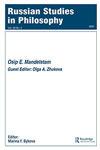鲍里斯·奇切林与俄国革命必须解决的问题
IF 0.1
4区 哲学
Q4 Arts and Humanities
引用次数: 1
摘要
俄国农民公社是农村生产力发展的障碍。根据Boris N. Chicherin的观点,这个问题应该自然解决,不需要任何具体的国家措施,包括安置政策,并以农民为代价。奇切林提出了通过鼓励劳动者建立互助基金、慈善事业、民间财团等方式解决劳动问题的方案。事实证明,这位俄国哲学家并没有充分认识到俄罗斯帝国劳工运动发展的问题及其原因。同样,奇切林提出了一种伦理方法来解决民族问题,主要是关于波兰人、芬兰人和犹太人的问题。他认为,一个特定地区的居民应该自己决定把哪个州视为自己的家园。波兰人民理应获得自由。对于犹太人,奇切林主张废除一切歧视性规范和做法,给予他们一切公民权利,反对公众和国家的反犹太主义表现。奇切林认为芬兰在俄罗斯帝国内的地位问题是允许该地区尽可能高度自治的问题之一。在详细分析齐切林的思想和理论的基础上,本文得出结论,尽管我们可以承认齐切林解决民族问题的方法是成功的,但他解决土地和劳工问题的方法只会使情况恶化。本文章由计算机程序翻译,如有差异,请以英文原文为准。
Boris N. Chicherin and Questions the Russian Revolution Had to Address
ABSTRACT The Russian peasant commune was an obstacle to the development of productive rural forces. According to Boris N. Chicherin, this problem should have resolved naturally and without any specific state measures, including resettlement policy, and at the peasants’ expense. Chicherin proposed resolving the labor question by encouraging workers to create mutual aid funds, charity, and private foundations. It turns out that the Russian philosopher was not sufficiently aware of the problem of the growth of and reasons for the labor movement in the Russian empire. Similarly, Chicherin suggested an ethical approach to the national question, primarily in relation to the Polish, Finnish, and Jewish peoples. He believed the inhabitants of a particular region should decide for themselves which state to consider their homeland. The Polish people deserved to be granted their freedom. As for the Jewish people, Chicherin proposed abolishing all discriminatory norms and practices, granting them all civil rights, and countering manifestations of anti-Semitism by the public and the state. Chicherin considered the question of Finland’s status within the Russian Empire one of allowing the region the highest possible autonomy. Based on the detailed analysis of the thinker’s ideas and theories, the article concludes that though we can recognize Chicherin’s approach to solving the national question as successful, his solutions to agrarian and labor problems would only have aggravated the situation.
求助全文
通过发布文献求助,成功后即可免费获取论文全文。
去求助
来源期刊

RUSSIAN STUDIES IN PHILOSOPHY
PHILOSOPHY-
CiteScore
0.10
自引率
0.00%
发文量
14
期刊介绍:
Russian Studies in Philosophy publishes thematic issues featuring selected scholarly papers from conferences and joint research projects as well as from the leading Russian-language journals in philosophy. Thematic coverage ranges over significant theoretical topics as well as topics in the history of philosophy, both European and Russian, including issues focused on institutions, schools, and figures such as Bakhtin, Fedorov, Leontev, Losev, Rozanov, Solovev, and Zinovev.
 求助内容:
求助内容: 应助结果提醒方式:
应助结果提醒方式:


